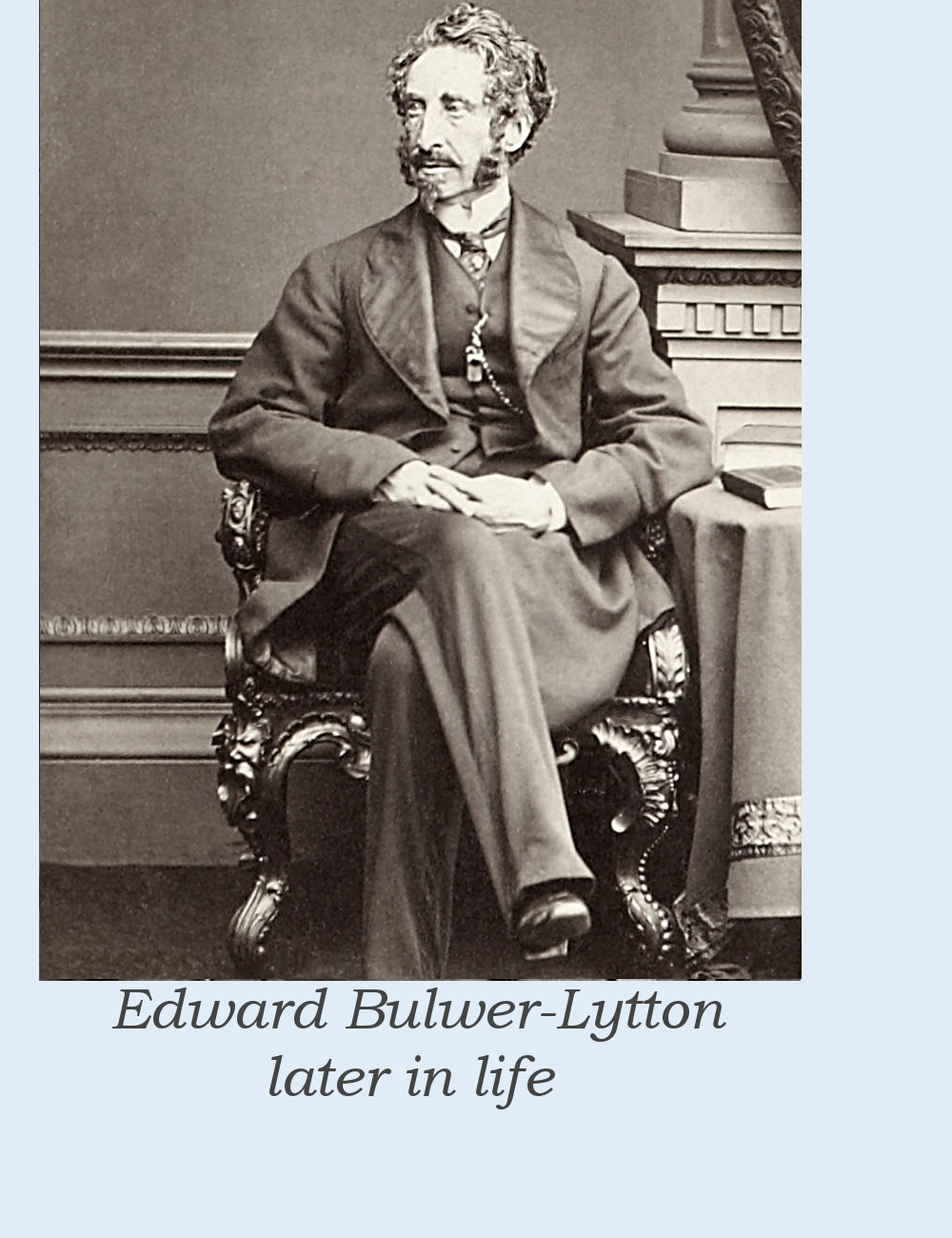
Edward Bulwer-Lytton
 Biography
BiographyEdward George Earle Lytton Bulwer-Lytton, 1st Baron Lytton, PC (May 25, 1803–January 18, 1873) was an English writer and politician. He served as a Whig member of Parliament 1831–1841 and a Conservative 1851–1866. He was Secretary of State for the Colonies June 1858–June 1859, choosing Richard Clement Moody as founder of British Columbia. He was offered and declined the Crown of Greece in 1862 after King Otto abdicated. He was created Baron Lytton of Knebworth in 1866.
He was born to General William Earle Bulwer of Norfolk, and Elizabeth Barbara Lytton, daughter of Richard Warburton Lytton of Knebworth House, Hertfordshire. He had two older brothers, William Earle Lytton Bulwer (1799–1877) and Henry (1801–1872), later Lord Dalling and Bulwer. His father died and his mother moved to London when he was four years old. When he was 15 a tutor named Wallington encouraged him to publish an immature work: Ishmael and Other Poems. Around this time Bulwer fell in love but the woman’s father induced her to marry another man. She died about the time that Bulwer went to Cambridge and he stated that her loss affected all his subsequent life.
In 1822 he entered Trinity College, Cambridge. In 1825 he won the Chancellor’s Gold Medal for English verse. In the following year he took his BA degree and printed for private circulation a small volume of poems, Weeds and Wild Flowers. He purchased an army commission in 1826 but sold it in 1829 without serving.
In August 1827 he married Rosina Doyle Wheeler (1802–1882), a noted Irish beauty, but against the wishes of his mother who withdrew his allowance, forcing him to work for a living. They had two children, Emily Elizabeth Bulwer-Lytton (1828–1848) and (Edward) Robert Lytton Bulwer-Lytton, 1st Earl of Lytton (1831–1891) who became Governor-General and Viceroy of British India (1876–1880). His writing and political work strained their marriage and his infidelity embittered Rosina. In 1833 they separated acrimoniously and in 1836 the separation became legal. Three years later, Rosina published Cheveley, or the Man of Honour (1839), a near-libellous fiction satirising her husband’s alleged hypocrisy. In June 1858, when her husband was standing as parliamentary candidate for Hertfordshire, she denounced him at the hustings. He retaliated by threatening her publishers, withholding her allowance, and denying her access to their children. Finally he had her committed to a mental asylum, but she was released a few weeks later after a public outcry. This she chronicled in a memoir, A Blighted Life (1880). She continued attacking her husband’s character for several years.
After the death of Bulwer’s mother in 1843, in accordance with her wishes, on February 20, 1844, he changed his surname from Bulwer to Bulwer-Lytton and assumed the arms of Lytton by royal licence. His widowed mother had done the same in 1811. His brothers remained plain Bulwer.
He had long suffered from a disease of the ear and for the last two or three years of his life lived in Torquay nursing his health. After an operation to cure deafness, an abscess formed in the ear and burst; he endured intense pain for a week and died at 2 in the morning, some four months short of his 70th birthday. The cause of death was unclear but it was thought the infection had affected his brain and caused a fit.
Rosina outlived him by nine years.
Bibliography (wildly incomplete)
Ishmael and Other Poems (poetry, 1818)
Weeds and Wild Flowers (poetry, 1826)
Falkland (novel, 1827)
Pelham (novel, 1828)
The Disowned (novel, 1828)
Paul Clifford (novel, 1830)
England and the English (non-fiction, 1833)
Godolphin (novel, 1833)
Asmodeus at Large (novel, 1833)
The Last Days of Pompeii (novel, 1834)
A Strange Story (novel, 1861)
Vril: The Power of the Coming Race (novel, 1871)
Other links
Encyclopaedia Britannica
Victorian-Era.org
Wikipedia